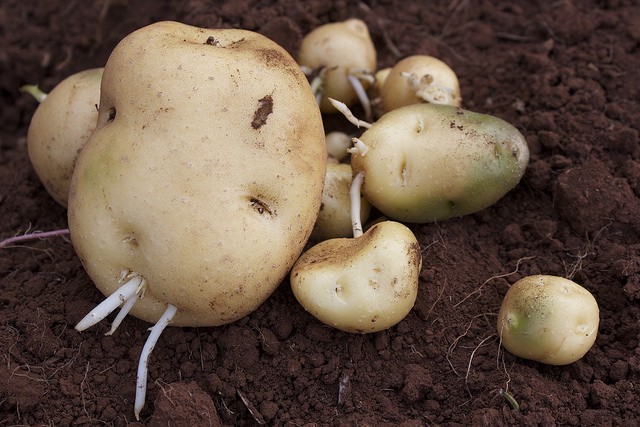 Sprouting potato seeds. The seeds can also be produced through cutting by rooted apical cutting technology. Photo courtecy.
Sprouting potato seeds. The seeds can also be produced through cutting by rooted apical cutting technology. Photo courtecy.
Anne Chepng’eno, a farmer from Molo has adopted rooted apical cutting technology to help him up her potato seeds production time from over a month to three weeks helping her supply seeds to her customers within the shortest time earning her about Sh1.8m a season.
The technology which was introduced to farmers during potato fair at the Wambugu Agriculture Training Centre in Nyeri is aimed at addressing the shortage of certified seeds and promoting the availability of clean seeds to farmers in all potato growing zones in the country.
“This technology is faster and simple to use because it involves production of potato seeds through stem cutting making it easier to propagate the seedlings before transplanting,” said the Nakuru County farmer.
RELATED ARTICLE: Potato seed treatment technology boosts farmers’ income
The resultant cutting is similar to a nursery grown seedling only that it is grown through vegetative means and not from the seeds, she said.
Instead of potato mini-tubers, the cuttings are produced from tissue culture plantlets in a screen house and after rooting, they are planted in the fields.
“These cuttings can stay in a screen house for about two to three weeks for them to develop proper roots before transplanting,” said Penina Mwisa, Kenya Agricultural and Livestock Research Organization (KALRO), tissue culture expert.
“A single cutting can produce up to 24 tubers which are then multiplied for two season before harvesting.”
RELATED ARTICLE: Choosing the right variety of potatoes scales up farmer’s income
However, farmers cannot propagate the seedlings at farm level but once they purchase the seedling, they can plant them in a nursery and later plant them for propagation.
Today there is potato seed demand of 100,000 tonnes in the country while basic demand by other seed multipliers is 1000 tonnes. Only 5000 tonnes is produced and supplied per year. KALRO produce 300 tonnes of potato seeds every year for farmers according to Henry Kemjo, Research and Development officer at National Potato Council of Kenya (NPCK).
Ann begun potato seed multiplication in 2005 on her six acres piece of land after applying to be one of the certified potato seed producer in the region by Kenya Plant health inspectorate Service (KEPHIS).
RELATED ARTICLE: Curing extends potato shelf-life to 40 days
She acquires her seeds from KALRO and involves KEPHIS in her production system to ensure that her seeds are standard free from diseases.
“I engage experts in every point of my stage of production; from where to plant the seeds, the type of seeds, weeding and harvesting among other agronomical practices,” said Ann.
An acre can produce over 20,000 clean seeds developed from the stem of a potato meaning she can produce up to 120,000 cuttings a season.
One cutting goes for Sh15 translating to Sh1.8m Ann’s earning in a given season.
















Comments powered by CComment